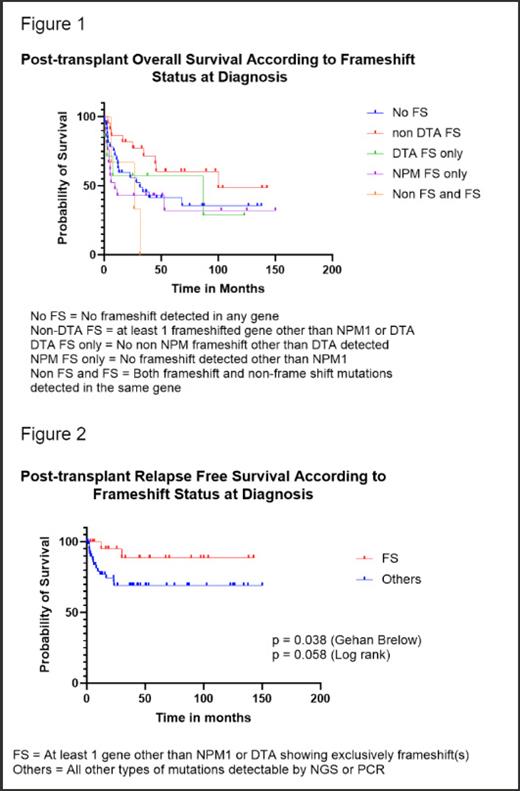Background
Allogeneic stem cell transplant (allo-SCT) is a mainstay of treatment for acute myeloid leukemia (AML) and offers the only chance of cure. The success of allo-SCT hinges greatly on the immune response of donor T lymphocytes against leukemia cells, known as graft versus leukemia effect (GvL). One of the key potential drivers of GvL is immune response to mutation derived neoantigens. Previous studies in solid tumors have demonstrated enhanced immunogenicity of frameshift derived peptides vs those from other mutation types (e.g. substitutions) due to the propensity of frameshifts to precipitate long novel amino acid strings distal to the site of mutation. We therefore hypothesized that AML cases bearing somatic frameshift mutations (FS) in leukemia associated genes would be more immunogenic than those with only other types of mutations (non-FS), and thus benefit more from allo-SCT via more robust GvL.
Methods
We retrospectively searched our institutional electronic medical records for de Novo AML patients who had undergone allo-SCT between 2009 and 2022 and had next generation sequencing data available on diagnostic specimens using a 42 gene hot spot panel. Via the Kaplan-meier method, we analyzed and compared the impact of tumor mutations present at diagnosis on overall survival and relapse free survival based on frameshift versus no frameshift status. Frameshift mutations only in DNMT3A, TET2 or ASXL1 (DTA) were not included in the frameshift group as previous studies have demonstrated DTA mutations to reflect mere clonal hematopoiesis and not to be strongly blast associated.
Results
89 de Novo AML patients were identified who had at least one mutation detected by NGS or PCR fragment analysis. Frameshifted genes identified included RUNX1, WT1, TP53, BCOR, CEBPA, STAG2, PHF6, ZRSR2, TET2, ASXL1 and NPM1. Our data shows superior overall survival (p=0.038; HR 2.1) post-transplant in patients who have at least one gene with frameshift mutations (n=22) other than DTA or NPM1versus those with only other types of mutations [FIGURE 1]. Relapse free survival was also significantly better (HR 3.8) in the frameshift group by Gehan-Breslow-Wilcox analysis (p=0.038) but not by the log rank test (p=0.058). Patients with non DTA frameshifts other than NPM1 further showed superior overall survival to patients whose only frameshift was NPM1 (HR 2.3, p=0.045). Three patients showed both non-frameshift and frameshift mutations in the same gene and showed significantly poorer overall survival than those with at least one exclusively frameshifted gene (HR=4.3, p=0.013).
Additionally, among patients with RUNX1 mutations (n=15) specifically, those with exclusively frameshifted RUNX1 (n=9) demonstrated superior overall survival (HR 4.8, p=0.042) to those who harbored non-frameshifted RUNX1 (n=6) [Figure 2]. Other mutations occurred with insufficient frequency to individually compare FS vs non-FS survival effects at the level of single genes.
Conclusion
Though limited by small sample size, our data suggest that frameshift mutated AML cases may benefit more from allo-SCT than those with only non-FS mutations, possibly due to increased generation of immunogenic neoepitopes. If validated in larger studies, incorporation of somatic frameshift mutation status in AML risk stratification models could improve existing patient selection algorithms for bone marrow transplant and thereby lead to superior outcomes.
Disclosures
Ramanathan:spouse owns stock options in Smith & Nephew: Current equity holder in publicly-traded company; spouse owns stocks in Alcon, biogen, boston scientific, dexcom, gilead, intuitive surgical, Moderna, Medtronic, Novartis,tandem diabetes, ocular therapeutics,Pfizer,Sanofi,vertex, viatris,: Current equity holder in publicly-traded company; spouse divested stocks in abbvie, Jansenn and BMS: Divested equity in a private or publicly-traded company in the past 24 months. Cerny:MERIT CRO: Consultancy, Honoraria, Membership on an entity's Board of Directors or advisory committees; Actinium Pharmaceuticals: Current holder of stock options in a privately-held company; BlueBird Bio, Inc: Current holder of stock options in a privately-held company; Cellectar Sciences: Current holder of stock options in a privately-held company; Dynavax Technologies: Current holder of stock options in a privately-held company; Gamida Cell: Current holder of stock options in a privately-held company; Atyr Pharma: Current holder of stock options in a privately-held company; Novavax Inc: Current holder of stock options in a privately-held company; Ovid Therapeutics Inc: Current holder of stock options in a privately-held company; Sorreto Therapeutics: Current holder of stock options in a privately-held company; Veru Inc: Current holder of stock options in a privately-held company; Viridian Therapeutics: Current holder of stock options in a privately-held company; Vaxart Inc: Current holder of stock options in a privately-held company; 2Seventy Bio Reg SHS: Current holder of stock options in a privately-held company; Bristol Myers Squibb: Consultancy, Honoraria, Membership on an entity's Board of Directors or advisory committees; ICON- Prolacta: Consultancy, Honoraria, Membership on an entity's Board of Directors or advisory committees; ICON- Allovir: Consultancy, Honoraria, Membership on an entity's Board of Directors or advisory committees. Patel:UMass Center for Clinical and Translational Science (CCTS) Pilot Project Program grant (NIH / NCATS Grant UL1TR001453: Research Funding; Bristol Myers Squibb: Consultancy, Honoraria, Membership on an entity's Board of Directors or advisory committees; Pfizer: Consultancy, Honoraria, Membership on an entity's Board of Directors or advisory committees.


This feature is available to Subscribers Only
Sign In or Create an Account Close Modal